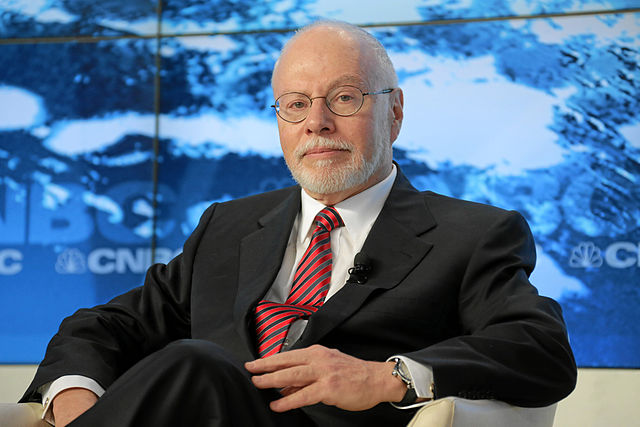|
Paul Singer Says Joke Is On Developed World Economies Who Steal Growth From the Future
Have you ever had that feeling that you’re the only one in the room who doesn’t get a joke? Elliott Management’s Paul Singer has when he looks at developed world policy prescriptions intended to improve economic growth. In an April 1 letter to investors reviewed by ValueWalk, Singer opines about central bank policy and connects the dots to rising populism.

Paul Singer
By World Economic Forum (Flickr: The Global Financial Context: Paul Singer) [CC BY-SA 2.0], via Wikimedia Commons
Paul Singer: When will a stimulus led bubble burst?
As the economic world sleepwalks through perhaps one of monetary policy’s most historic points, and bedrock principles in economic textbooks are not just bent, but broken with glee over a $4.6 trillion Fed balance sheet, negative interest rates and debt piling up to elicit some of the weakest growth central bank stimulus can buy, when will the bubble pop and wake up the world?
Singer, as reported in ValueWalk, has never been a fan of a monetary shell game that steals growth from the future to spend in the present.
While investing superstar Jeremy Grantham, founder of the asset management firm GMO, tells the Financial Times that high stock market valuations are here to stay, Singer disagrees. He looks at the “many years” of economic policy as being “extraordinarily distorted” and wonders not entirely when it will end, the only question is how it will end.
“Despite what appears to be limited room for further appreciation of equities, and the extremely high prices of bonds in an environment in which monetary stimulus is either being removed or planning to move in that direction, there is no way to tell when, or whether, markets will adjust to a different set of expectations and prices,” he wrote, noting the difficulty of predicting exactly when a price re-adjustment will occur.
“It is also impossible to determine whether a major adjustment will occur gradually or suddenly. We think current financial market conditions are untenable and that a sudden crack is more likely, but conditions of this type have historically persisted for a lot longer than anyone could think possible,” he said, echoing previous thoughts of bond investor Jeffery Gundlach.
Calling attempts to predict the timing of a market crash “fools errand,” Singer looks at the “Trump rally” with a degree of skepticism, saying that if some wins are not put on the board and positive momentum generated towards pro-growth policies, another recession could be around the corner in a developed world where monetary repression is code for manipulation of free markets.
Paul Singer – Are price controls the larger issue?
Perhaps the larger issue is that of price controls, which have a history of ending badly.
Price controls resulted in devastation with the old Soviet Union being the classic example with the ruin that is Venezuela, once one of the richest countries in the South American hemisphere, being the latest example.
But what have price controls in global debt markets done? These dots are not often connected in the mainstream, and here Paul Singer is at his radically transparent best.
“Solving a growth and debt problem by printing money, issuing debt and easing all facets of monetary policy is both growth-suppressive and highly risky in terms of future inflationary forces,” he wrote to investors, many of whom are living in the moment with blinders on and just letting the future take care of itself.
Quantitative easing has been compared to trickle-down economics for various reasons, but most materially the evident result of the program has been to increase asset values held by the wealthy, namely stocks, real estate and high-end art among other assets, all of which rose in dramatic fashion during the quantitative stimulus era.
One benchmark of the quantitative stimulus era is corporate profit margins, which Singer notes are at or close to historic highs in the developed world where monetary meddling in free markets has been most apparent. But what this really represents is a shift in economics where a corporate profit margins highlight a “continued ascendency of the power of capital over the power of labor.”
Start connecting dots and look at the income loss in the middle class over recent history and understand the real rage that ignited onto the political landscape in 2016. To Singer, it is monetary gymnastics that “explains why political fringe movements and ‘populists’ are getting a hearing.“
To understand the problem, don’t look at the unemployment rate, much of it filled with temporary jobs without benefits. Its average wages that matter most:
Notwithstanding the reported low unemployment rates (compared with the depths of the crisis), people leaving the labor force and real wages declining are the undercurrent and the real story behind the existing societal discontent. The developed world has not yet established comprehensive solutions to the problem of high-priced workers being undercut by either technological change or emerging market workers doing the same jobs for a fraction of the pay.
In short, the “whatever it takes” attitude towards staying out of a recession may be focusing on the wrong problems.
Tags: Elliott Mana
|

